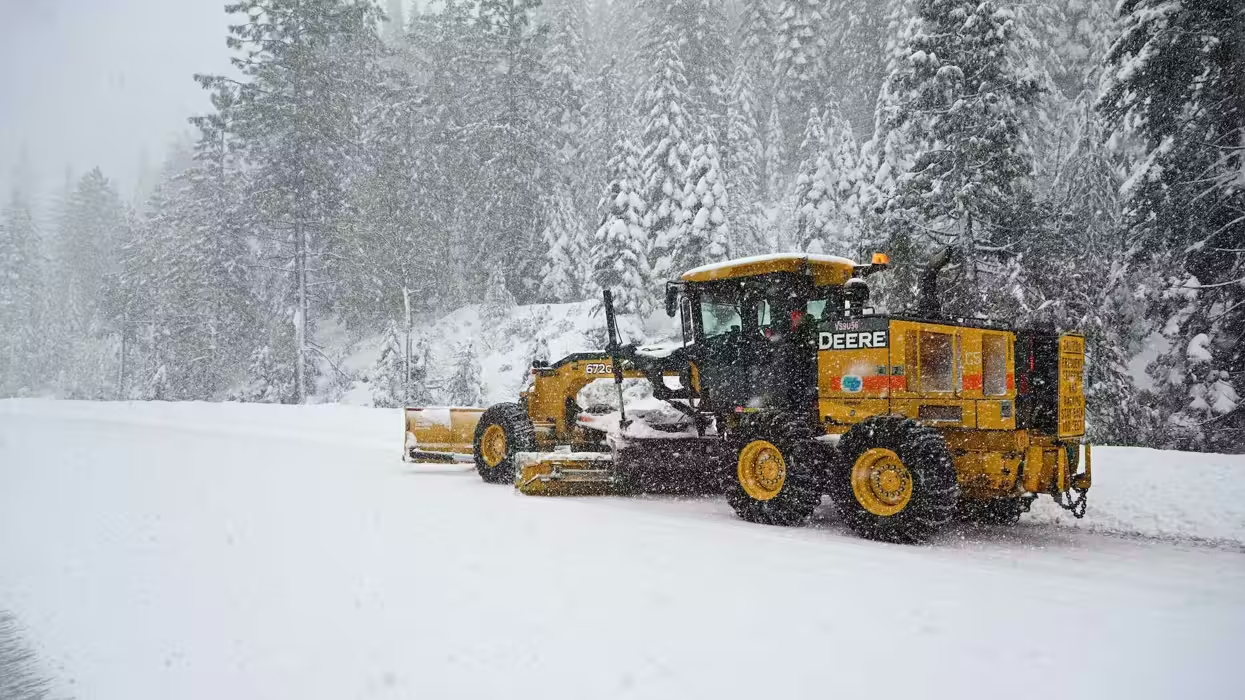
© 2026 Blaze Media LLC. All rights reserved.
Dispatches From Drought-Stricken America: A Day Spent With Oklahoma Farmers
August 23, 2012
“I don’t know that America does much praying any more.”
This is part one of a series TheBlaze is doing on drought-stricken America. Stay tuned for additional stories
--

Western Oklahoma is a sea of dirty white trucks with “cow-catchers” on the front. Jerry waited for me in his truck outside of Walmart in Guymon, Oklahoma. The big Ford wasn’t dirty yet, it just had dirt inside of it -- seemed natural.
On the way out to pick up Garland, another farmer, also in Texas County, Jerry and I talked politics and trucks.
“When I first got this truck my Sirius XM subscription died. I called to get it renewed and some little girl from the city, probably New York or something, was the operator.”
He chuckled.
“She asked me for a password and I said ‘farmer’. She kind of laughed and asked me ‘why farmer?’ I told her that is what I am. A farmer.”
Jerry looked over at me in the passenger seat and at my six-year old daughter, Ava, who was sitting in back of the cab. He continued.
“The girl was a little perplexed, she said, ‘I didn’t know people still did that’.”
“Where do you think your food comes from?” Jerry asked her. Jerry half smiled when he shared the operator’s answer. “The store.”

We parked in front of the local Baptist Church and waited for Garland. The church was big and red, obviously built in the last decade. They just put a new metal roof on it. Ava lept from the truck to show us cartwheels in the green front lawn of the church. Only 30 minutes prior, before we joined Jerry in his truck, Ava emerged from the back seat of our rental car, after her second consecutive viewing of "Soul Surfer" to make an observation.
“It’s green dad. You tricked me.”
“I didn’t trick you.”
“Dad, look right there. Green. Look behind us. Green. Look right there... Grass, it’s right there.” Very staccato this time. “It is perfectly green. Look at the trees.”
I was at a loss. “What about that yellow?” I asked, pointing to another field.
“They just don’t water their plants,” she said with incredulity. “They just don’t have a hose, right? ...the stores have buckets, the stores have hoses.”
I offered up a half-serious prayer in my head. “Oh please, don’t let her say this to the farmers and ranchers” who were less than 2 minutes away at the time.
--
My kids alternate trips with me when I’m able to drive. I was beginning to question my parenting strategy of advertising her trip to the drought as the “best trip of the year."
Once Garland joined us we headed toward the edge of town to tour another friend's, Dennis’s, farm. Alternating dirt and paved roads we talked farming and ranching. Jerry and Garland shared some of the economics of farming in Texas County, Oklahoma. Numbers will vary from region to region, but Texas County is among the highest grossing counties of all seventy-seven counties in Oklahoma in terms of agriculture.
- In a regular year, corn sells for $5-$6 per bushel. A good acre yields between 180-200 bushels. So an acre in a regular year might gross between $900-$1200 in a season.
- Their cost of water, herbicide, seed, and fertilizer is right around $800 per acre per season. If the farmer is renting the land, it’s more. Labor is more. Equipment purchases and depreciation also add to the cost. A tractor with requisite horsepower to work a big farm can cost over $250,000. A combine is about $250,000 as well.
We drove by a field with about 25 head of cattle, who were all nosing through the thistle.
“It looks like they’re all eating dirt,” I observed. Brilliant.

I had the growing sensation throughout our time together that my chosen lifestyle had rendered me somewhat out of touch with reality. My boots came up only to about mid ankle. My jeans were Lucky Brand. I pulled up in a red Kia Soul -- a rental car, but embarrassing nonetheless. And to top it all off, I had a sinking feeling that my daughter was going to say something any minute that completely outed me as a failed father in front of two really nice guys. Guys whose kids, although grown now, probably said “yes ma’am and yes sir” and who probably ate dinner with them around an actual table where they passed things to each other and talk about their day.
We continued down the dirt road toward the farm, waving at Dennis’s wife and her friend out for a walk, and I learned about ranching in Texas County.
- A cow typically grazes 10-15 acres worth of food in a regular season.
- A man in Texas County just reported that this year, he is only able to support 25 head of cattle on his 1400 acre ranch. 56 acres each.
“That really means that many people are just having to get rid of their cattle,” explained Garland.
We pulled up to Dennis’s farm, known as a “dry farm” because he operates from a well and rain water as opposed to irrigation. Dennis is tall and friendly and wears a cowboy hat. We walked over to the edge of his wheat field and watched the sunset, the whole way down. Ava wastes no time exposing the lessons I’ve skipped as a dad.
“Oh, look. Kittens!” She bent down to pick one up. So did Jerry.
“Are these kittens for free?”
“No, I need those kittens around the farm,” Dennis explained. Ava looked up, puzzled. “Those are my mouse traps,” he continued. She looked at me for clarification.
“Cats catch mice honey,” I shrugged at the guys. I had six years to cover that and she got it on the farm in about 5 minutes. She grabbed Dennis’s hand and pulled him to the corral.
“Can I pet the bull?”
“Oh, I don’t see why not honey.” They hopped the metal fence and approached a resting bull and began to pet his side. I hopped the fence next and reached out my hand to pet the bulls forehead. Oops. The snort startled me, but it was the force of head flip that sent me back a few steps.
“Daddy must not have heard when we said not to pet his head,” Dennis explained to Ava. She pursed her lips and tried not to laugh. They finished petting the bull and chasing a baby calf. Dennis also explained that, “stepping on poop” is part of living on a farm. Ava, who potty trained herself at 18 months- out of disgust, didn’t seem to mind the cow poop how Dennis explained it.

We stood by the old metal swing set while Jerry pushed Ava on a rope swing. The moon was rising now. Big stars were starting to appear.
I looked at the three farmers. “This drought isn’t like a tornado or a hurricane, where people can come and help you rebuild or bring you food. I don’t think American’s know what to do to help you. What can we do to help?”
Dennis shifted his weight and exhaled through his nose.
“Well, you know a drought is cured with rain. And of course the problems that come up with a drought, theres lots of ‘em. I don’t know. I hesitate to prescribe an answer to the public.” For the first time that night, Dennis seemed at a loss for words. He was quieter now.
He continued, “You know, it tests people’s character. Uh, plainly said,” he wanted to say something but couldn’t. He pressed forward, “Plainly spoken from a person of faith, I’d say the best thing America could do would be to be a good neighbor and pray for rain.”
He paused.
“But I don’t know that America does much praying any more.”
“You know one thing that’s different around here, then in places where people that get rain every day,” Jerry said wistfully, “is that if it does rain, I mean, you can’t imagine how we appreciate the smell of a good rain. You go out and dig a little bit just to smell that moist top soil.”
Garland added, “I just stand out on the back porch and watch it rain.”
“The forecast looks like it called for it later this week though, right?” I added.
They chuckled, and Dennis answered, “Yeah, it usually calls for it ‘bout once a week.”
Want to leave a tip?
We answer to you. Help keep our content free of advertisers and big tech censorship by leaving a tip today.
Want to join the conversation?
Already a subscriber?
more stories
Sign up for the Blaze newsletter
By signing up, you agree to our Privacy Policy and Terms of Use, and agree to receive content that may sometimes include advertisements. You may opt out at any time.
Related Content
© 2026 Blaze Media LLC. All rights reserved.
Get the stories that matter most delivered directly to your inbox.
By signing up, you agree to our Privacy Policy and Terms of Use, and agree to receive content that may sometimes include advertisements. You may opt out at any time.






